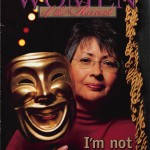What is a turkey? It could he a stupid, inept individual. Do you bowl? It could denote three strikes in a row. Yes, it is also that country in Asia Minor occupying part of the Balkan Peninsula. And if we “talk turkey” we are speaking bluntly. “Cold turkey”, for a drug addict or an alcoholic, means an abrupt withdrawal from these substances.
None of the above describes that North American bird with a naked head and a bright, red, wrinkled wattle hanging from his chin, large, spreading, tail feathers–with a plump body between! The unique throaty call of the male, or Tom, brings to mind another name, the “Gobbler”. He is the centerpiece of our all American Thanksgiving dinner–the pièce de résistance.
Can you recall the rich aromas associated with the holidays? Do you begin to salivate just remembering the tantalizing smells of a turkey roasting to a crisp, golden brown? As that first slice is cut, remember how the juices seep out and you hear instant calls for a drumstick, white or dark meat with plenty of stuffing? It is far better to participate than reminisce.
I remember one turkey that never made it to our table. My husband and I, with our children, were serving as global workers under The Orinoco River Mission. We were staying with friends in a Venezuelan oil camp, planning to leave for furlough the next day. Suddenly there were sounds breaking the afternoon s siesta silence unlike the usual whistling and chattering—normal bird talk of the parrots and parakeets in the surrounding mango trees. About the same time the door bell rang and I went to see who was there.
Two Venezuelan Christians from a neighboring town had come to say, “Good-bye”. Columba and Genara were standing outside the door and Genara was holding a large turkey by its legs. Poor Tom Turkey was unhappy and at intervals expressed his annoyance with a series of “gobble, gobble, gobbles”.
Because of the turkey the two ladies declined to come into the house. Venezuelans, unlike most Americans, never come right to the point when they call on you. We talked about their families, our families, the church program in our absence, our trip home and a number of other topics, accompanied by an occasional “gobble, gobble!”
Finally Genara reached out to put the turkey in my hand saying, “We want you to take this turkey with you and have a big celebration with your family.” It is not unusual for Venezuelans to carry chickens, turkeys or even pigs with them when they travel. Presumably, hostess gifts.
I did not take the turkey from Genara but began as diplomatically as possibly to explain to her why we could not take the bird on the plane with us. The two women knew nothing about quarantine, nor the cost of a carrying cage and air freight.
I concluded, “So you see, we could never take a live bird to the States with us.” I thought the matter was settled but Genara caught one word, “live”. Her hand instinctively went for the turkey’s neck! Fortunately for the turkey we were able to stop her in time. “No turkey, alive or dead, can go with us,” I explained again.
At first our friends thought we were just rejecting their gesture of love. Reluctantly, Genara handed the turkey to her mother. To my surprise she began removing the wedding band from her right hand. It is customary to wear your wedding ring on the right hand, not the left, in Venezuela.
Taking my hand in hers, Genara placed her ring there and closed my fingers tightly around it. Then with tears streaming down her cheeks, she sobbed, “You must take this with you so that you have something of ours to remind you of us and bring you back again.” Our tears mingled together as we hugged and said our “good-byes.”
I intended to return the ring to Genara but before that was possible it was stolen, one of several items that were taken. During that furlough year, and several times since, I have shared the account of Genara s love gift with others.
A wedding band speaks of a man’s love for a woman or a woman’s love for a man, a circle without beginning or ending. God’s gift of love was His Son who demonstrated that love by giving His life for all mankind. “Greater love has no one than this, that one lay down his life for his friends.” (John 15:13)
And there is no danger of us ever being lost or stolen because Jesus Himself said, “they shall never perish and no one shall snatch them out of My hand.” (John 10:28)
The turkey? He went home with our two friends. They were to keep him and have him for dinner when we returned the following year. We made it back but he was long gone! We enjoyed a chicken dinner instead.
©2003 Thrive
View the original print magazine where this article was first published.


